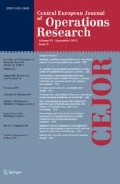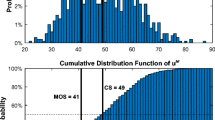Abstract
A key feature of dynamic problems which offer degrees of freedom to the decision maker is the necessity for a goal-oriented decision making routine which is employed every time the logic of the system requires a decision. In this paper, we look at optimization procedures which appear as subroutines in dynamic problems and show how discrete event simulation can be used to assess the quality of algorithms: after establishing a general link between online optimization and discrete event systems, we address performance measurement in dynamic settings and derive a corresponding tool kit. We then analyze several control strategies using the methodologies discussed previously in two real world examples of discrete event simulation models: a manual order picking system and a pickup and delivery service.
















Similar content being viewed by others
References
Angelopoulos S, Dorrigiv R, López-Ortiz A (2007) On the separation and equivalence of paging strategies. In: Proceedings of the 18th annual ACM-SIAM symposium on discrete algorithms, pp 229–237
Becchetti L, Leonardi S, Marchetti-Spaccamela A, Schäfer G, Vredeveld T (2006) Average-case and smoothed competitive analysis of the multilevel feedback algorithm. Math Oper Res 31(1):85–108
Ben-David S, Borodin A (1994) A new measure for the study of on-line algorithms. Algorithmica 11(1):73–91
Blom M, Krumke S, de Paepe W, Stougie L (2000) The online TSP against fair adversaries. In: Bongiovanni G, Petreschi R, Gambosi G (eds) Algorithms and complexit. Springer, Berlin, pp 137–149
Borodin A, El-Yaniv R (1998) Online computation and competitive analysis. Cambridge University Press, Cambridge
Boyar J, Favrholdt L (2007) The relative worst order ratio for online algorithms. In: ACM transactions on algorithms, 3(2), article no. 22
Boyar J, Favrholdt L, Larsen K, Nielsen M (2003) Extending the accommodating function. Acta Inform 40(1):3–35
Boyar J, Larsen K, Nielsen M (2002) The accommodating function: a generalization of the competitive ratio. SIAM J Comput 31(1):233–258
Cassandras C, Lafortune S (2008) Introduction to discrete event systems, 2nd edn. Springer, Berlin
Coffman E, So K, Hofri M, Yao A (1980) A stochastic model of bin-packing. Inf Control 44(2):105–115
Cordeau J, Laporte G (2003) A tabu search heuristic for the static multi-vehicle dial-a-ride problem. Transp Res B Methodol 37(6):579–594
Croes GA (1958) A method for solving traveling-salesman problems. Oper Res 6(6):791–812
Csirik J, Woeginger G (2002) Resource augmentation for online bounded space bin packing. J Algorithms 44(2):308–320
Dorrigiv R, Lopez-Ortiz A (2007) Adaptive analysis of on-line algorithms. In: Fekete S, Fleischer R, Klein R, Lopez-Ortiz A (eds) Robot navigation, number 06421 in Dagstuhl Seminar Proceedings, Internationales Begegnungs- und Forschungszentrum für Informatik (IBFI). Schloss Dagstuhl, Germany
Dorrigiv R, López-Ortiz A (2008) Closing the gap between theory and practice: new measures for on-line algorithm analysis. In: Proceedings of the 2nd international conference on algorithms and computation, pp 13–24
Dorrigiv R, López-Ortiz A, Munro J (2009) On the relative dominance of paging algorithms. Theor Comput Sci 410(38–40):3694–3701
Dunke F (2014) Online Optimization with Lookahead. Ph.D. thesis, Karlsruhe Institute of Technology
Fiat A, Woeginger G (1998) Competitive odds and ends. In: Fiat A, Woeginger G (eds) Online algorithms: the state of the art. Springer, Berlin, pp 385–394
Franaszek P, Wagner T (1974) Some distribution-free aspects of paging algorithm performance. J ACM 21(1):31–39
Ghiani G, Laporte G, Musmanno R (2004) Introduction to logistics systems planning and control. Wiley, Hoboken
Grötschel M, Krumke S, Rambau J (eds) (2001) Online optimization of large scale systems, Springer
Grötschel M, Krumke S, Rambau J, Winter T, Zimmermann U (2001) Combinatorial online optimization in real time. In: Grötschel M, Krumke S, Rambau J (eds) Online optimization of large scale systems. Springer, Berlin, pp 679–704
Henn S, Koch S, Wäscher G (2012) Order batching in order picking warehouses: a survey of solution approaches. In: Manzini R (ed) Warehousing in the global supply chain. Springer, Berlin, pp 105–137
Hiller B (2009) Online optimization: probabilistic analysis and algorithm engineering. Ph.D. thesis, Technische Universität Berlin
Huber C (2011) Throughput analysis of manual order picking systems with congestion consideration. Ph.D. thesis, Karlsruher Institut für Technologie
Jaynes E (1957) Information theory and statistical mechanics. Phys Rev 106(4):620–630
Jaynes E (1957) Information theory and statistical mechanics II. Phys Rev 108(2):171–190
Kallrath J (2005) Online storage systems and transportation problems with applications: optimization models and mathematical solutions. Springer, Berlin
Kalyanasundaram B, Pruhs K (2000) Speed is as powerful as clairvoyance. J ACM 47(4):617–643
Karlin A, Manasse M, Rudolph L, Sleator D (1988) Competitive snoopy caching. Algorithmica 3(1–4):79–119
Karlin A, Phillips S, Raghavan P (2000) Markov paging. SIAM J Comput 30(3):906–922
Kenyon C (1996) Best-fit bin-packing with random order. In: Proceedings of the 7th annual ACM-SIAM symposium on discrete algorithms, pp 359–364
Kirkpatrick S, Gelatt CD, Vecchi P (1983) Optimization by simulated annealing. Science 220(4598):671–680
Koutsoupias E, Papadimitriou C (2000) Beyond competitive analysis. SIAM J Comput 30(1):300–317
Krumke S, Laura L, Lipmann M, Marchetti-Spaccamela A, Paepe Wd, Poensgen D, Stougie L (2002) Non-abusiveness helps: An o(1)-competitive algorithm for minimizing the maximum flow time in the online traveling salesman problem. In: Proceedings of the 5th international workshop on approximation algorithms for combinatorial oimization, APPROX ’02, 200–214, Springer
Lawler E, Lenstra J, Rinnooy Kan A, Shmoys D (eds.) (1985) The traveling salesman problem: a guided tour of combinatorial optimization. Wiley
Miller C, Tucker A, Zemlin R (1960) Integer programming formulation of traveling salesman problems. J ACM 7(4):326–329
Müller A, Stoyan D (2002) Comparison methods for stochastic models and risks. Wiley, Hoboken
März L, Krug W (2011) Kopplung von Simulation und Optimierung. In: Krug W, Rose O, Weigert G (eds) Simulation und Optimierung in Produktion und Logistik: Praxisorientierter Leitfaden mit Fallbeispielen. Springer, Berlin, pp 41–45
Psaraftis H (1995) Dynamic vehicle routing: status and prospects. Ann Oper Res 61(1):143–164
Raghavan P (1991) A statistical adversary for on-line algorithms. DIMACS Ser Discrete Math Theor Comput Sci 7:79–83
Scharbrodt M, Schickinger T, Steger A (2006) A new average case analysis for completion time scheduling. J ACM 53(1):121–146
Sleator D, Tarjan R (1985) Amortized efficiency of list update and paging rules. Commun ACM 28(2):202–208
Spielman D, Teng S (2004) Smoothed analysis of algorithms: why the simplex algorithm usually takes polynomial time. J ACM 51(3):385–463
Stadtler H, Kilger C (eds.) (2008) Supply chain management and advanced planning: concepts, models, sftware, and case studies. Springer, 4th edn
Toth PM, Vigo D (eds.) (2002) The vehicle routing problem. SIAM
Verein Deutscher Ingenieure (VDI) (1996) VDI-Richtlinie 3633. Simulation von Logistik-, Materialfluß- und Produktionssystemen: Begriffsdefinitionen. In: VDI-Handbuch Materialfluß und Fördertechnik, Beuth
Young N (1994) The k-server dual and loose competitiveness for paging. Algorithmica 11(6):525–541
Author information
Authors and Affiliations
Corresponding author
Rights and permissions
About this article
Cite this article
Dunke, F., Nickel, S. Evaluating the quality of online optimization algorithms by discrete event simulation. Cent Eur J Oper Res 25, 831–858 (2017). https://doi.org/10.1007/s10100-016-0455-6
Published:
Issue Date:
DOI: https://doi.org/10.1007/s10100-016-0455-6




